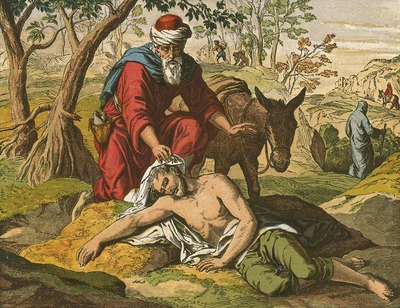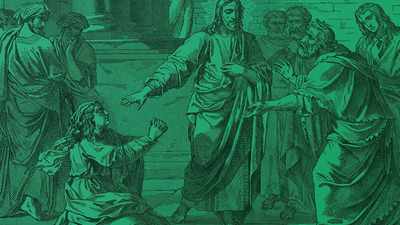November 26, 2023
|by N W
|
0 Comments
|
Advent, Charity, Christmas, Deacon Mark, Eternal Life, Love, Service
The Solemnity of Our Lord Jesus Christ, King of the Universe
November 26, 2023 — Year A
Readings: Ez 34:11-12, 15-17 / Ps 23 / 1 Cor 15:20-26, 28 / Mt 25:31-46
by Rev. Mr. Mark De La Hunt, Permanent Deacon
Here, on the doorstep of the season of Advent, we pause and meditate on the solemnity of “Our Lord Jesus Christ, King of the Universe.” He has absolute sovereignty over all creation, for He created it. And yet, in four weeks we enter the mystery of His becoming man, born in a stable, no crib for a bed, His dad a blue-collar worker and His mom a teenage girl. From now until Christmas, we walk from today’s discomfort at the foot of His judgment seat to the joy and peace of His manger in Bethlehem. These are the poles of our spiritual journey and the religious road between them is called Advent.
I encourage you to make a resolution for Advent that will be your gift for Jesus at Christmas. Consider making a different holy resolution each day or week of Advent. One I recommend is to find a quiet time to listen to St. Mother Teresa’s Nobel Peace Prize acceptance speech on YouTube and ponder it in prayer. Hearing the voice of a great saint is a precious gift.
I listened to her speech early one morning, and it cast a familiar Bible verse in a different light for me. In morning prayer that day, I read this beatitude: “Blessed are the pure of heart, for they shall see God (Mt 5:8).” I always interpreted this as meaning something along the lines of, “If you live a holy life with Jesus, you will go to heaven and see God.” In her speech Mother Teresa shared stories of the poor in an intimate and tender way, and as I listened, that beatitude led me from the foot of Jesus’ judgment seat to the side of His manger. You might say I had an epiphany.
We will come back to Mother Teresa’s speech in a bit, but now let’s meditate on the scriptures. Just as there is a dichotomy between Christ King of the Universe and Christ in a manger, there is one between the Old Testament readings where Jesus is a good shepherd and the last two where He is a king and judge (Kreeft 778). How are they connected? As our shepherd, He leads us in how to live for the day we will be judged.
In Ezekiel 34, God says, “I myself will be the shepherd of my sheep…I will seek the lost, bind up the crippled, and I will strengthen the weak (Ez 34:16).” Jesus is judge, but He does not sit back and wait for us to succeed or to fail, relishing the day He will judge us. On the contrary, in Psalm 23 He says He will “lead [us] in paths of righteousness (3).” Why? In the verse before that He says He desires to “lead [us] beside still waters, [to] restore [our] soul (Ps 23:2).” One could say that He leads us in how to do good things that restore our soul for our day of judgment, but how is that related to still waters?
Ever look at a pond or lake in the stillness of the early morning, when the water is perfectly flat? It acts as a mirror, reflecting the trees and the sky, and somehow that reflection is more beautiful to us than if we simply looked directly at the trees and sky. So it is when He “restores our soul.” When we take up our cross and follow Him, loving our neighbor, we are at peace, and He restores our soul. It is then that our restored soul becomes like still waters, reflecting Jesus’ love. Others can read about His love directly, but it is more impactful when they see it reflected in us.
Leaving the comfort of the first reading and psalm, we move to the discomfort of the second reading: “Then comes the end, when He delivers the kingdom to God the Father after destroying every rule and every authority and power…until He has put all His enemies under His feet (1 Cor 15:24-25).” Who is under His feet? His enemies, yes, but in today’s gospel we are; everyone is.
In the gospel He is sitting up high on His throne which is also the judgment seat (Mt 25:31-32). He moves one hand and many are moved to His left. He moves His other hand and some are moved to His right (Mt 15:33). Those on the right to eternal life in the kingdom prepared for them and those on the left to eternal punishment (Mt 15:34, 46).
How will He judge us? If there is a judge, then there must be a law to judge by. Jesus said, “I give you a new commandment; love one another (Jn 13:34).” May God have mercy on those who say we do not need works to get into heaven and then cherry pick verses, out of context, to support their wishful thinking. St. Paul called Jesus’ new commandment a law writing “…love one another; for the one who loves another has fulfilled the law (Rom 13:8).” Jesus gives us the consequences of breaking that law. In Matthew 7 He said, “Not everyone who says to me, ‘Lord, Lord,’ will enter the kingdom of heaven, but only the one who does the will of my Father in heaven (21-23).”
Those words made some uncomfortable, so they tried to negotiate with the King of the Universe. Here is how that went. “Lord, Lord, did we not prophesy in Your name? Did we not drive out demons in Your name? Did we not do mighty deeds (miracles) in Your name?” Jesus responded, “I never knew you. Depart from me, you evildoers (Mt 7:22-23).” Prophecies, exorcisms, and miracles are all good things, and God allows even sinners to perform them, for they are good for His people. But if one does those things without love for their neighbor, then doing those things does not fulfill the law.
That leads us to today’s gospel, which is the conclusion of several Sundays of warnings from Jesus about the end of time. The last two weeks we heard about the virgins running out oil for their lamps and being locked out of the wedding banquet. And about the servant who did not give his master a return on his talents and so was cast out into darkness weeping (Mt 25:1-30). Jesus saved the most disturbing warning for last. Disturbing, because He spells it out for us today. He clarifies what the symbolism was for the oil in the virgins’ lamps and the servants’ talents. He points out those ever so serious sins that lie hidden in our conscience like a copperhead snake amidst some leaves.
The sins I speak of lead us to another good Advent resolution. Examine our conscience for sins of omission, those acts of love we failed to do. Jesus gives us an examination of conscience in today’s gospel. “When did we see you a stranger and welcome you, or naked and clothe you? And when did we see you sick or in prison and visit you (Mt 25:38-39)?” And the King of the Universe replied, “Truly, I say to you, as you did it to one of the least of these my brethren, you did it to me (40).”
A good examination of conscience is free of excuses. Excuses did not work well for the miracle workers who were without love. Here are some questions you can turn into Advent resolutions. Have I introduced myself to a new parishioner or to a new neighbor and welcomed them? Have I gathered up the extra coats, shoes, and clothes in my home and given them away? Have I helped feed the hungry? Is prison ministry on my heart, and if so, how can I act on it? Could you bring your children or a friend to visit a nursing home? Is there someone who is sick that you can go and pray with or help with their chores that are going undone?
If you are still feeling comfortable because judgment day sounds so far off, then listen to these somber words from the Church.
“The New Testament speaks of judgment primarily in its aspect of the final encounter with Christ in His second coming, but also repeatedly affirms that each will be rewarded immediately after death in accordance with his works and faith. The parable of the poor man Lazarus and the words of Christ on the cross to the good thief, as well as other New Testament texts speak of a final destiny of the soul—a destiny which can be different for some and for others (CCC 1021).”
“Each man receives his eternal retribution in his immortal soul at the very moment of his death, in a particular judgment that refers his life to Christ [King of the Universe]: either entrance into the blessedness of heaven — through a purification or immediately — or immediate and everlasting damnation (CCC 1022).”
So when will you die? I have been surprised at how many of my high school classmates I have outlived. They were so much healthier than me. Our particular judgment can come at any time. In the first verse of the gospel next week, Jesus says, “Be watchful! Be alert! You do not know when the time will come (Mk 13:33).”
Now we are in the proper frame of mind to turn to Mother Teresa for guidance and hope. In her Nobel prize acceptance speech, her stories of seeing extraordinary goodness in the poor shed new light on Jesus’ words, “Blessed are the pure of heart, for they will see God.” What does “pure of heart” mean? St. Angela Merci kept the answer simple, “Charity does not sin.” When, with love, I welcome the stranger and visit the sick, my heart is pure in that moment. It is free of sin.
My epiphany while listening to Mother Teresa’s stories of the poor was that, when I am lovingly caring for the hungry, the thirsty, the stranger, the naked, the sick and the imprisoned, I am pure of heart and I…see…God. I see the person, but in them the King of the Universe is looking back at me. And in that sacred moment, I travel the Advent road from Jesus’ judgment seat in heaven to the manger in Bethlehem where our King joins us in all our suffering.
Have mercy on us, oh King of the Universe, and send us Your Spirit to lead us from the fear of Your judgment seat to the hope of Your manger. Amen.
CITATIONS
Kreeft, Peter. “Food for the Soul; Reflections on the Mass Readings, Cycle A.” Word on Fire 2022.
Mother Teresa. Nobel Peace Prize Acceptance Speech. YouTube.
Catholic Church. “Catechism of the Catholic Church.” 2nd ed., Our Sunday Visitor, 2000.
KEEP READING
 540-586-8988
540-586-8988 










